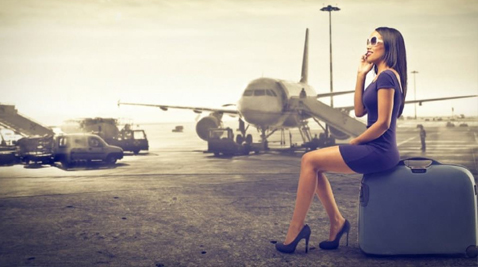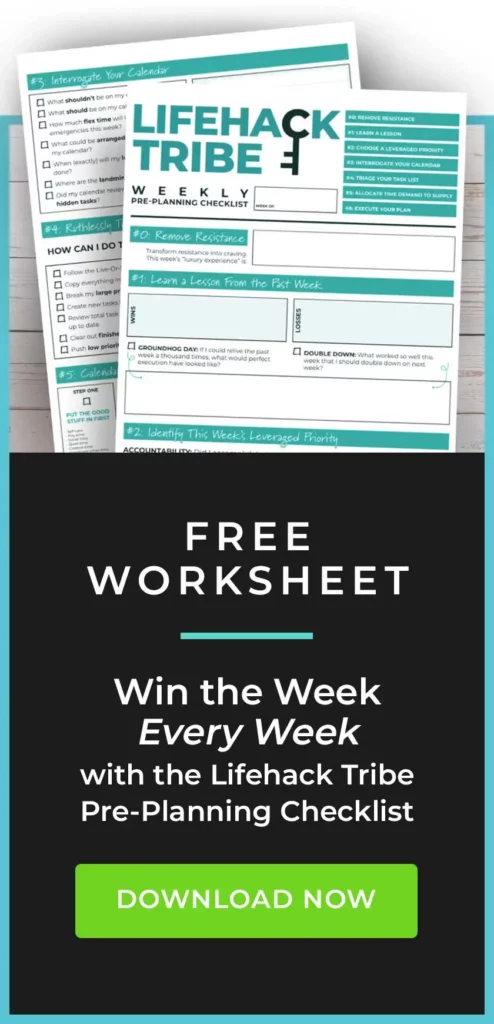A lot of my clients travel – either for work or pleasure – on a regular basis.
1.3 million people travel for business every single day in the United States (and another million travel for pleasure). This never-before-seen scale of travel is extremely disruptive to our workflow.
Yet we still think we can pluck ourselves from our regular lives, hurdle through space in a metal tube at 600 mph, and come out the other end just as energetic and focused.
The truth is: all our routines get interrupted when we travel. But it’s definitely still possible to be productive on the road!
My husband and I meet people all the time who travel and stay on top of their workload. We’ve come to be pretty good at it ourselves since becoming fully nomadic. Last year we traveled to 12 countries – all the while running our online business.
Here’s our best learnings for getting (and staying) productive while traveling.
Quick overview:
- 1 in 5 people feel more productive after traveling because it improves well-being, lower stress, and boosts creativity.
- Planning ahead by researching your destination and scheduling work during your most productive hours will help you be productive while traveling.
- Setting the right kind of goals, prioritizing tasks, and maintaining a healthy routine are all important if you want to be productive while traveling.
How does travel affect your productivity?
The truth is, a lot of good can come from traveling.
Research has found that the more we travel, the better our problem-solving and communication skills are. It also improves well-being, lowers stress, and boosts creativity and focus.
No wonder 1 in 5 people feel more productive after a trip.

But if you research your destination, set goals, and prioritize well, it is possible to be productive while traveling.
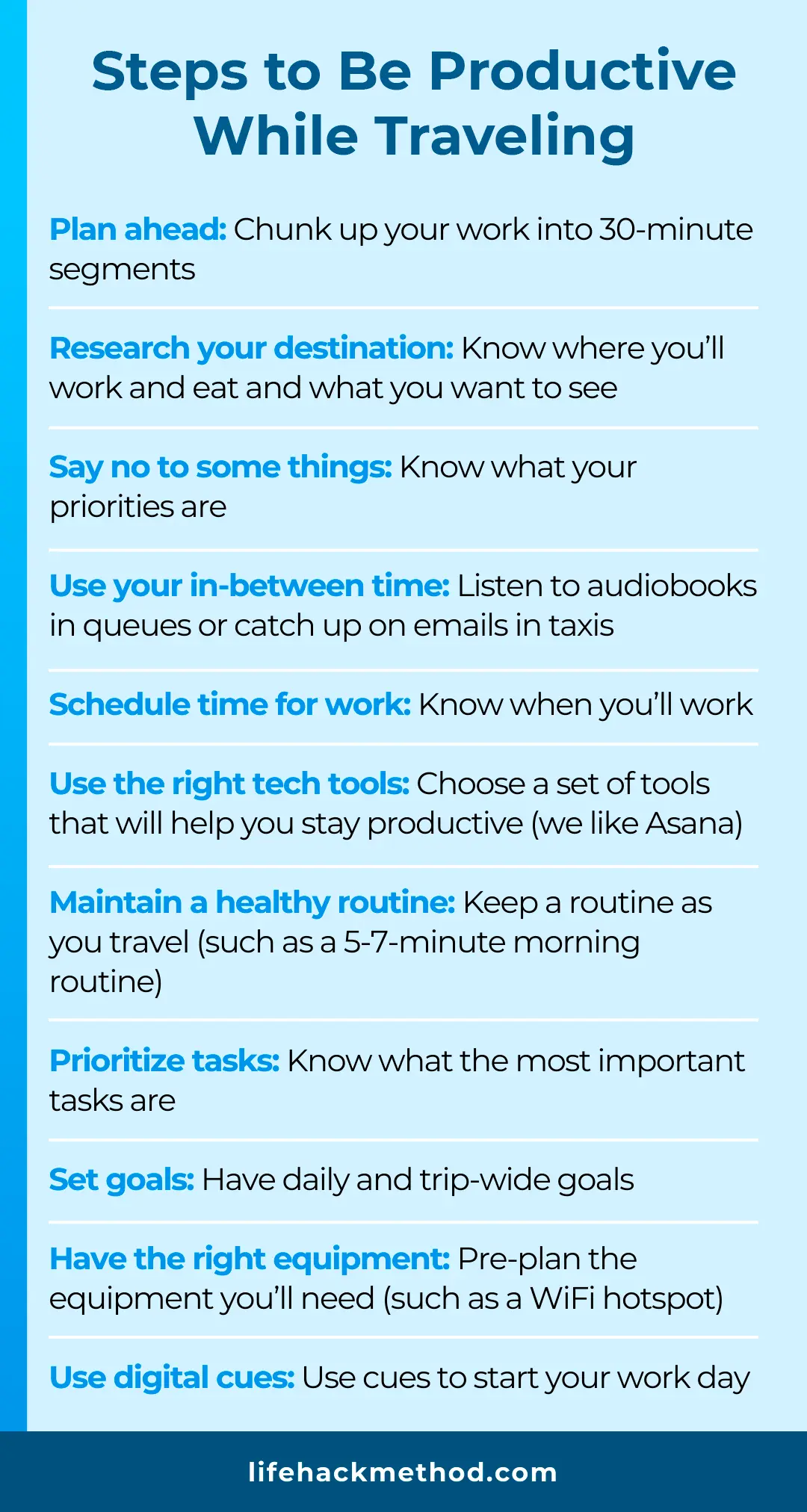
1. Plan ahead
Pre-planning is a simple, yet effective trick to be productive while traveling.
Several weeks before you start your trip, look ahead in your calendar and game out what your life and work will be like during your trip.
Like a general preparing for battle, the goal is to get on the offense instead of slipping into defense. People usually assume they’re going to be able to get practically the same amount done as they would in the office when they travel.
And while that’s a noble goal to aspire to, most of us know that’s unrealistic if not foolhardy.
My formula is pretty simple.
Everything you do when you travel is going to take twice as long, so assume you’re going to get half as much done. Cut your task list in half and delegate, eliminate or push off the rest!
Once you’ve cleared out obstacles and optimized your calendar (no meetings or deadlines scheduled during your travel), the next step is to chunk up your work into 30 minute (or even 15 minute) segments. That way, you can bust out your laptop in the lobby when you unexpectedly have to wait half an hour for your hotel room to be ready.
30 minutes may not seem like very long, but you can get a lot done in that short time if you’re prepared. I get hours of work done in transit between airports, taxis, and other dead time just by having my task list laid out in small chunks.
That doesn’t include working on the plane – I rarely work in the air.
Want to learn more about planning the right way?
That’s what I share in this video:
2. Research your destination
I know, I know – this seems like a no-brainer, right? Who doesn’t do their research before a trip?
But I don’t mean just figuring out what sights to see or activities to do.
To be productive while traveling, you have to plan your days effectively. That means knowing the locations of essential amenities such as restaurants, cafes, and attractions.
If you don’t, you’ll spend more time trying to find a place to be productive while traveling than you will getting anything done!
Luckily, apps that will help you find somewhere to work are available.
Workfrom offers tons of variety, including cafes, hotel lobbies, and parks. Croissant will help you find a coworking environment.
Remember to research sightseeing, too! Staying in a place near your planned activities and convenient workspaces will help you maximize convenience and efficiency.
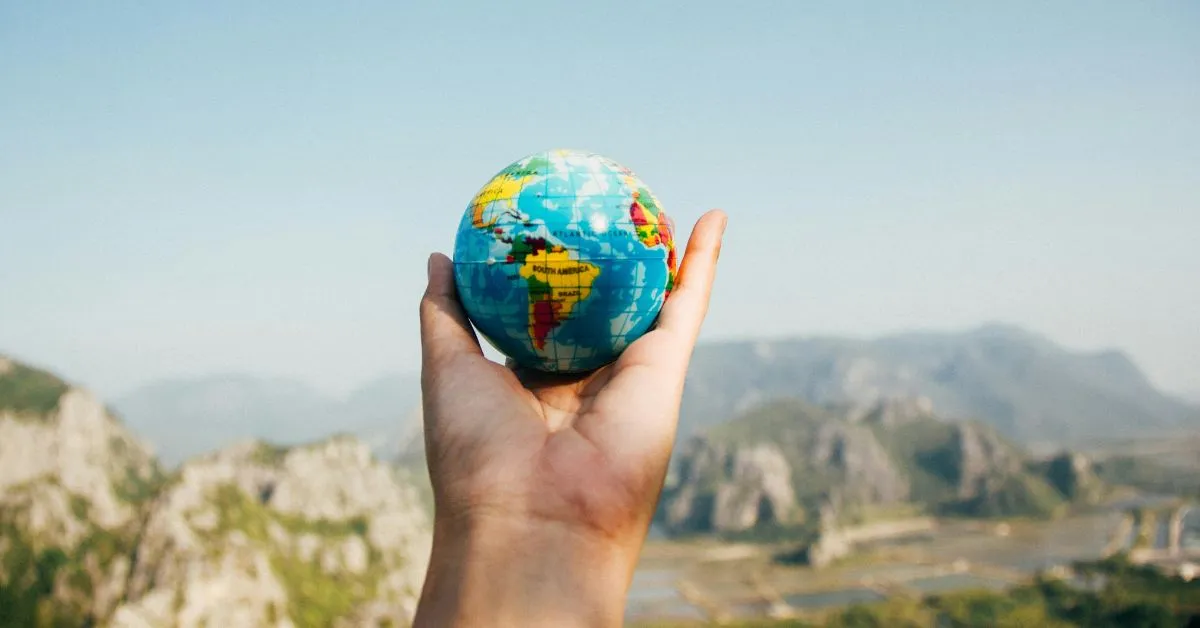
3. Say no to some things
If you’re combining work and leisure, remember you won’t have time for everything!
And it’s okay to say no.
And just like researching your destination helps you be productive while traveling, knowing how to choose wisely is key. Think of it as creating space for what truly matters.
For example, saying no to a late-night bar crawl will keep you well-rested for a productive morning, and declining a sightseeing tour will give you time to catch up on emails or relax.
4. Use your “in-between” time
You could have the most detailed itinerary in the world and still have what I like to call “in-between” time while waiting at an airport, traveling to your next stop, or waiting for a reservation.
It’s a great opportunity to be productive while traveling! Finish some work, catch up on emails, tackle quick tasks, or brainstorm.
Listening to podcasts or audiobooks is also a great way to spend those precious few minutes between activities.
5. Schedule time for work
One of the best ways to be productive while traveling is to schedule your work and play.
First, figure out when you’re most productive and schedule your work sessions when you know your energy will be high and you’ll be able to get more done.
Then, schedule your leisure time and activities around those hours.
Remember what I said about doing your research? Planning your activities ahead of time will help you use your time more efficiently.
And after you’ve created that schedule, stick to it! It’ll help you enjoy your trip without compromising productivity.
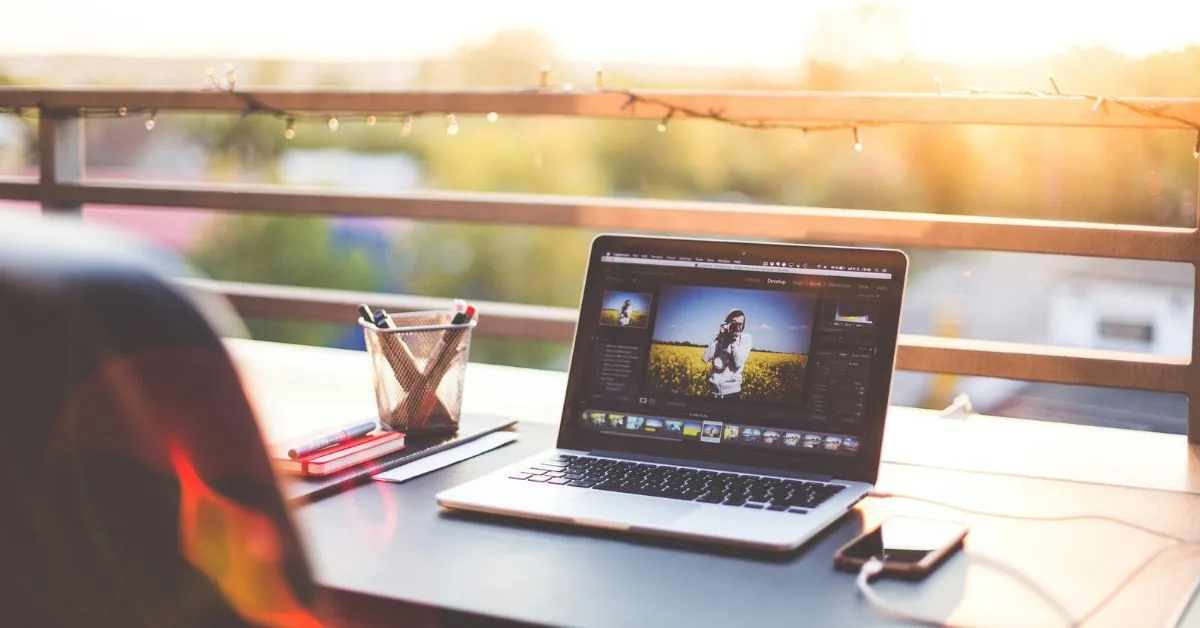
6. Use the right tech tools
To be productive while traveling, you need tools to help you stay organized and connected. The key is finding one available at any time on any device.
You know I swear by task managers like Asana, even when I want to be productive while traveling.
But I also recommend:
- Google Workspace (formerly Google Suite), which is cloud-based and includes apps like Docs, Sheets, and Drive
- Gmail for secure and reliable email, plus a ton of storage and features like spam filtering
- Zoom, which allows you to host virtual meetings from anywhere
- Microsoft Planner, which compiles all of your Microsoft 365 apps into one place
- Todoist, which operates more as a virtual to-do list than a task manager
7. Maintain a healthy routine
A lot of people complain that their routines get sabotaged while traveling.
That’s a real bummer when you return home and have to establish the habit all over again. The solution to this is not to abandon your routines completely on the road.
Instead, condense them into a travel-friendly routine.
For example, your travel morning routine could last about 5-7 minutes. That means focusing on the one or two most important aspects of your personal morning routine. For some people that’s journaling, for others that’s stretching. Keep the parts that really wake you up and get you focused for the day, and get rid of the rest.
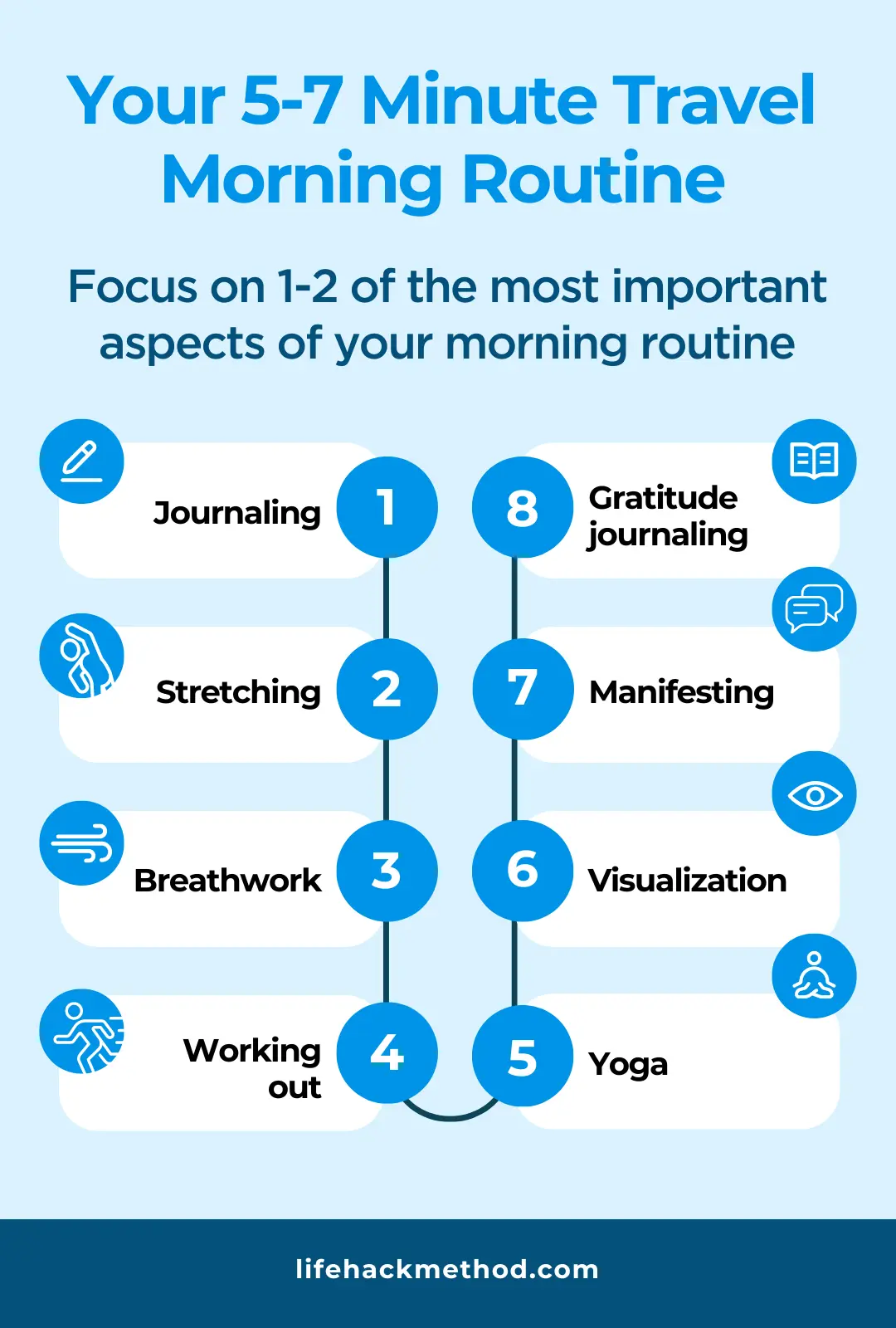
Plus, studies show that people who don’t eat healthily are 66% less productive than those who do.
If you have a sensitive stomach, stick to bland healthy foods in small quantities when you travel. I eat as little airplane food as possible and nothing with sodium or sugar. It dramatically improves my energy directly after landing.
Jetlag hack: It can be torturous, but you’ve got to immediately adjust to local time. If it’s breakfast time, eat breakfast. If it’s bed time, go to bed. In fact, I’ll start changing my sleep schedule on the plane. I recommend getting a solid workout in the first day you arrive, because exercise will help reset your body clock.
8. Prioritize tasks
Knowing which tasks to prioritize will help you be productive while traveling.
I recommend using the Champagne Moment.
Think about all of the tasks you could get done this week. Which one would you be SO happy to finish that you would celebrate with champagne?
That’s how you know what’s actually a priority right now.
Hear more in this video:
9. Set goals
Goals keep us productive by providing clear direction, motivation, and focus whether we’re trying to be productive while traveling or working at home.
I recommend setting two: Daily goals and trip-wide goals.
Daily goals, like checking off two tasks or visiting a museum, will help you create the most effective schedule possible.
On the other hand, trip-wide goals like learning five basic phrases in the local language will help give your entire trip a greater sense of purpose.
Both types of goals are important.
Daily goals will help you track your progress and adjust as needed, while trip-wide goals will help you measure the success of your trip as a whole.
10. Have the right equipment
Unlike your office, WiFi isn’t a guarantee in every place that you’re going to be while traveling. Especially in airports, hotel lobbies and at conferences, WiFi is particularly slow, unreliable, and not secure.
There are two ways to approach this setback.
First, create your own WiFi opportunities. Most smartphones are hotspot enabled.
Contact your carrier about the specifics of getting your personal hotspot ready to go on your phone.
You can also buy mobile WiFi devices that can connect you to the internet no matter where you are. You’ve also got to be able to work offline. That means that you’ve got to make all of the tech and documents that you need available whenever and wherever you need them.
For example, my team uses Google Docs/Sheets/Slides for pretty much everything. Before we hop on long haul flights, we make sure to enable offline editing.
Other travel necessities are:
- Noise canceling headphones: seems like a novelty, actually a necessity! If someone sits next to you with a crying baby in an airport, it’s impossible to focus. UNLESS you’ve got noise canceling headphones. I use them religiously.
- Power blocks: nowadays, there are power blocks with enough power to charge certain laptops. I recommend getting one that holds at least ten charges for small devices. We charge our phones, Kindles and portable wifi devices with ours and only have to recharge it once a week.
- Light-blocking eye masks: a simple tool that makes a HUGE difference when you’re trying to sleep in an airport or on a plane.
- Disposable face masks: they dial back the intensely cold, filtered air in airplanes and prevent germs from getting you sick.
11. Use digital cues
We naturally cue ourselves to our physical environment. We can make coffee in our own house with our eyes closed, we know walking into the office signifies it’s time to work.
But when we travel, all of these cues are stripped from our daily routine, which can make getting into the zone pretty hard to do.
My top tip for overcoming the lack of physical cues is to create digital cues for yourself. You can create auditory cues for important productivity events throughout your day using your phone and computer.
This could be always listening to the same soundtrack or playlist to cue you to start working, or having different alarms on your phone for starting or finishing work.
These digital cues can help you transition from your travel haze to your work mindset a lot quicker, and cut out the unnecessary time spent confused and distracted.
Once you open your laptop and your pre-planning list is in front of you, you can dive right into the work you need to get done.
If you want to learn more about how to combine work and travel, take a look at this short video:
What’s next?
These tips have transformed how I travel, so that I can stay in control and still move my agenda forward. Travel should be a great experience, so remember to relax and enjoy the journey!
Unforeseen issues can derail your plans, but accepting that some things are out of your control is part of the process.
If you’re prepared for whatever is thrown at you, you can still be productive while traveling.
You just need to know how to plan thoroughly.
And that’s where our Winning the Week Method comes in.
It’s helped thousands of people stay in control of their to-do lists, and it can help you, too – no matter where your travels take you.

